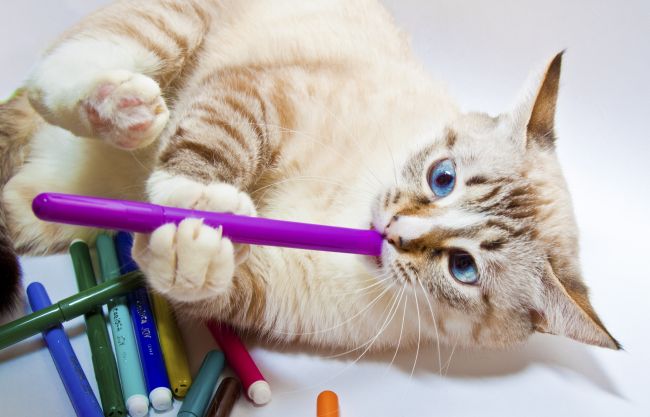
Like dogs, cats have their own repertoire of oddities and unusual mannerisms or expressions. From chattering at closed windows, to eating paper, drooling, and dropping dead mice at our door steps, cats have entertained and baffled their humans for as long as the blissful domestic cohabitation has existed. Unravel some of the mysteries by learning why cats do the strange things they do!
Unusual Cat Behavior and What They Mean
Sneering/Making funny faces: Though most people do not know it, there is a term for that strange sneering face that cats make, when they lift their upper lip and look as if they are sniffing/laughing or hissing. That is called the flehmen response, and cats do it when they are trying to sense a situation or to gauge what is going on with the other animals around them through the scent of pheromones.
Ignoring humans: The simple answer? They ignore us because cats are not cognitively as developed as dogs, when it comes to understanding their need for human companionship. Cats are independent survivors, and scientific studies show they do not always see the need for connecting with us that dogs do.
Why do cats bring in their latest kill? Cats often leave mutilated corpses for their owners to find in inconvenient locations, leaving many owners to question, why do they do this? Cats bring their kill either because it is their instinct to take their prey to a safe haven for consumption, or because they are showing us their good work, or simply because they are trying to train us on how to follow their lead in hunting and survival skills.
Strange sounds: Not all cats are created equal in the vocal department, since some breeds are much more talkative than others. Nevertheless, cats are known for their unique range of peculiar vocalizations, each of which have a different meaning. Cats chirp when they are soothing their young, they “mew” to gently remind us to feed them, and they moan repeatedly when they are in pain. Whatever the cause might be, cats make strange noises to communicate many messages.
Why do cats eat weird things? When a cat habitually is found chewing on knitted sweater sleeves, socks, strings, plastic bags or even plant leaves, this behavior is called Pica. Cats eat weird things when they have a lack of fiber or vitamins in their diet, when they are under stress, have been recently displaced or interrupted, or are in need of a comfort akin to nursing. Fortunately, this bizarre behavior can be treated.

Hairballs: An unpleasant side effect of having a cat, is having to deal with their hairballs. Because felines groom themselves so frequently, their comb-like tongues pick up the loose hair which often gets swallowed and caught in the digestive track. The cat then coughs until the hairball can be regurgitated. Though it is natural for cats to have hairballs, they can be minimized in a number of ways.
Eye contact what does it mean: Many pet owners experience intense eye contact with their cat, which many find to be rather unnerving. Cats stare when they are focusing on potential prey, when they are posing a territorial challenge or when they are trying to understand what we are about to do.
Why do cats drool? Dog’s aren’t the only ones who create their fair share of slobber-slime. Felines drool most often out of happiness or relaxation (caused by petting, catnip, pampering or grooming), or they drool when they have ingested something poisonous, or if they are having oral health issues. Drooling may also indicate that the kitty is fighting off a disease, and should be treated.
Why cats land on their feet? Feline spines have what is known as a “righting reflex” which causes them to shift and reposition themselves mid-air so as to land on their feet. This function of reorienting mid-fall has been a life saver for many cats.
Meowing at night: Cats make noise all day, but there seems to often be a pattern of some cats meowing and yowling more steadily at night in different stages of their lives. Cats howl at night when they are in pain, or have a health issue; they howl when they are awake and lonely, or feel abandoned and want company. Elderly cats will wail miserably when they are disoriented, and younger cats will howl when they are in heat.
Why do cats like fitting in small spaces? Cats tend to squish their bodies into unusual postures and tiny areas for several reasons. They like fitting in small spaces to retain body heat when it’s cold, for comfort when they feel insecure, and for a hideaway when they need privacy.
Why do cats groom so obsessively? Cats groom themselves multiple times a day, and the like to groom other cats as well. Felines groom for many reasons, some of which are: to be bathed clean, to remove the human scent on their fur, to cool their body temperature, to soothe any cuts or sores, to relax and help them increase blood flow.

